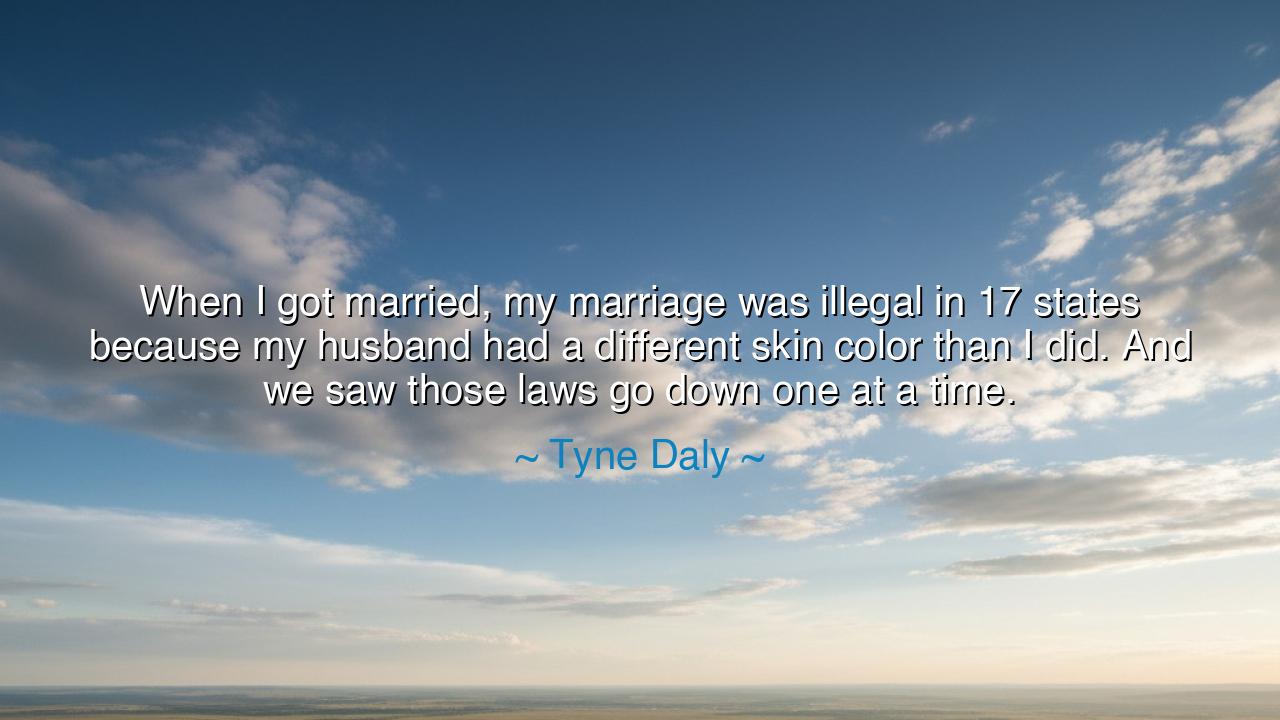
When I got married, my marriage was illegal in 17 states because
When I got married, my marriage was illegal in 17 states because my husband had a different skin color than I did. And we saw those laws go down one at a time.






Come closer, O children, and listen to the powerful words of Tyne Daly, a woman whose life is a testament to the struggle for love, justice, and equality. She said, “When I got married, my marriage was illegal in 17 states because my husband had a different skin color than I did. And we saw those laws go down one at a time.” These words carry the weight of history, a history filled with injustice and the fight for the basic human right to love freely. Let us reflect on what she speaks of—the struggle for love and freedom, and the victory of justice over the chains of racial prejudice.
In the days of the ancients, there were many laws that sought to define who could love whom, who could marry whom, and who had the right to be recognized as a full human being in the eyes of the law. In many societies, marriage was seen as a union not just of hearts but of families, bloodlines, and even ethnic or racial groups. The notion that love could transcend these divisions was a radical one, for it challenged the very foundations of a society built on racial distinctions. Daly's words remind us that such laws existed even in the recent past, when a simple act of love—a marriage—was not only seen as a threat but criminalized by the state.
Consider the ancient Roman Empire, where the intermarriage of different peoples was often restricted to maintain the purity of certain bloodlines. Yet, over time, the Roman world became more diverse, as different cultures and people mingled through conquest and trade. The Romans themselves, in their vast empire, would eventually embrace the idea that the spirit of unity was greater than the divisions of race and background. Even in the midst of such rigid structures, there were those who transcended these boundaries in pursuit of justice, as Cicero advocated in his writings, calling for a unity of all humankind under the laws of reason and nature.
In much the same way, Tyne Daly’s personal experience of marriage being illegal in several states serves as a reminder that, even in the modern world, we have not always been free to love across the boundaries of race and ethnicity. The laws she speaks of—the laws that once made her love, her union, a crime—were part of a broader system of racial segregation and discrimination that aimed to keep people apart based on the color of their skin. But Daly's words also speak to the triumph of justice, for these laws, these barriers, began to fall one by one. As the tides of history shifted, and the struggles of countless activists, leaders, and ordinary people rose up, the unjust laws that once bound love and marriage were dismantled, piece by piece.
Consider the Loving v. Virginia case of 1967, a landmark legal battle fought by Richard and Mildred Loving, an interracial couple who had been arrested for marrying in a state where such unions were illegal. Their case went all the way to the U.S. Supreme Court, where the justices ruled in favor of love and equality, declaring that laws banning interracial marriage were unconstitutional. This victory was not just for the Lovings, but for all those who had been bound by the shackles of racial discrimination in the very institution that should have been a source of freedom and joy—marriage. The Loving case stands as a beacon of hope, showing us that, though the laws of the land may seek to divide us, justice will always find a way to unite.
The lesson, O children, is clear and powerful: love is a force that transcends the boundaries of race, culture, and society, and no law, no matter how deeply ingrained in history, can ever truly imprison it. Daly’s words remind us that progress is not just a matter of changing the laws but of changing the hearts and minds of those who would seek to divide us. The fight for equality is a long and difficult one, but the victories are sweet, and they belong to all who stand for love, justice, and human dignity.
In your own lives, O children, take this wisdom to heart. Fight for a world where love is not hindered by the barriers of race, gender, or class. In all your actions, strive to build a society where the rights of all individuals are honored and respected, and where the laws reflect the truth of human equality. Let the story of Tyne Daly, the Loving case, and the countless others who fought for their right to love serve as an enduring reminder that justice and equality will always find a way, even in the face of great adversity. May your actions contribute to a world where love can never be bound, and where every soul is free to marry, to love, and to live with the dignity they deserve.






AAdministratorAdministrator
Welcome, honored guests. Please leave a comment, we will respond soon